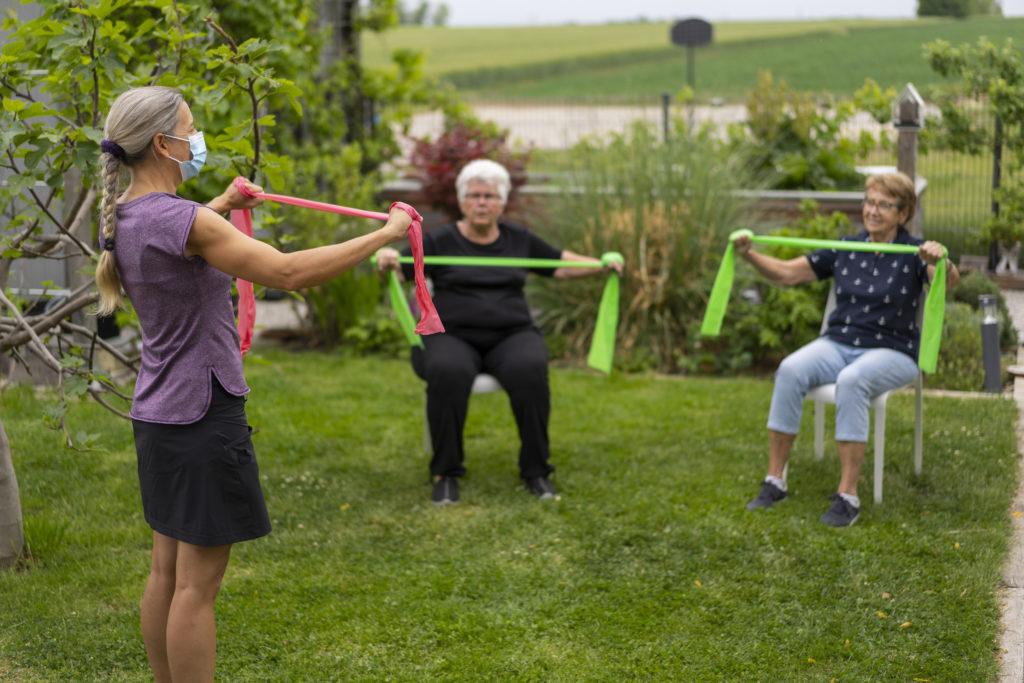Families often ask us how to make the most of their visits to elderly relatives residing at home or at Assisted Living and Memory Support Communities, especially those who have Alzheimer’s disease or a related cognitive impairment. While we have provided tried and true tips for visiting a loved one with memory loss in the past, the Covid-19 pandemic has presented new challenges, with many struggling to find ways to keep the conversation light and engaging.
With restrictions being eased across the country, you will have more opportunities to visit your loved one in person. You may notice physical and cognitive changes since the last time you visited, as seniors have had limited ability to exercise and socialize, and their daily routines have been disrupted. You may also notice signs of Mild Cognitive Impairment (MCI), or early stages of memory loss that you didn’t see before.
This may be difficult for you, but it is important to understand and adapt to your loved one’s new reality, and to adjust your expectations for your visit. We hope that the following tips and resources will help make your visit meaningful for both you and your family member.
Step 1: Prepare for your visit with a senior loved one
When planning your visit to your loved one’s home, or to an Assisted Living or Memory Care Community, it is important to choose a time limit that you are comfortable with. As few as 15 to 20 minutes can make for a good visit. When you arrive, if possible, turn off any sources of background noise such as the TV or music.
Here are some helpful articles to read in anticipation of your visit:
- If you are bringing children to visit a loved one with dementia
- If you are visiting someone with Alzheimer’s during the holidays
- If you are looking for gift ideas for someone with memory loss
Step 2: Follow our 8 Tips for a Successful Visit

Those with memory loss, even early signs, live in a different reality from our fast paced, noisy lives. Theirs is slow, quiet, and based in the remote past which is a predictable place in its familiarity of people and routines. While you may be watching the news daily and keeping yourself updated on Covid data and research, this is likely not a focus, nor a good conversation topic, for someone with Alzheimer’s or dementia. They cannot sustain staying in the present; it is too difficult and confusing. Try this instead:
- Identify yourself each time you visit, by your first name: “Hi Mom. Brad, your son, is here to spend some time with you.” It may take a full minute for your loved one to orient to you being there and to recognize who you are.
- Use open ended questions that have no right or wrong answer and will elicit more than a “yes” or “no” response.
- When asking your loved one to make a decision, offer only two choices. For example, “Do you want to walk with me now, or talk together first?”
- Talk slowly and simply. Avoid complex concepts and repeat information as necessary to be clear.
- Let your loved one take the lead in the conversation. Address one topic at a time. Don’t jump from subject to subject, especially in mid-sentence. Processing information is made more challenging by Alzheimer’s or MCI.
- Plan a task to be completed while you’re there, such as a short walk with easy slow talk, reading a story, listening to music together, giving your Mom a manicure, or looking through a photo album.
- Communicate positive feelings through quiet hand holding, a light back rub, or a hand resting on the back or forearm.
- Avoid arguing with your loved one’s perceptions of things and don’t correct your loved one when he or she is wrong. Check out this video from Teepa Snow about entering dementia’s reality.

Putting aside everything else that is happening in the world to focus on your visit can be challenging, and it can be made even harder by concerning changes you may notice in your loved one. If you are visiting them at home and notice serious changes that make you feel they are no longer safe living alone, it may be time to consider a move to a more supportive living arrangement. For most, the decision to move is based on the realization that Mom or Dad could use a little extra help and would benefit from individualized services, including personal care, medication monitoring and healthy meals. During our new normal dealing with Covid-19, Assisted Living and Memory Care Communities also provide new social outlets to combat the isolation that older adults are experiencing living at home alone, with the opportunity to make new friends and have multiple touchpoints with supportive and caring staff during their day.


 Lindsay Willis
Lindsay Willis